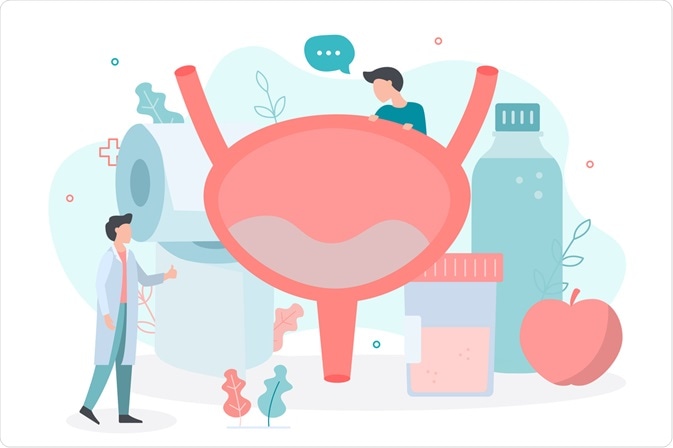Antibiotics are the first-line treatment of choice, as bacteria are responsible for causing urinary tract infections (UTIs). In some cases, symptomatic relief is also used to provide immediate relief from the burning and urgency associated with a UTI.

Image Credit: Katy Flaty / Shutterstock.com
Uncomplicated infections
Approximately half of all UTI cases will resolve of their own accord, even without treatment, within a few days or weeks. However, a short course of antibiotics (3-5 days) is almost uniformly sufficient in treating the causative bacteria, eliminating symptoms, and preventing recurrence of the infection.
Oral antibiotics that may be used to treat uncomplicated UTIs include trimethoprim, sulfamethoxazole, nitrofurantoin, cephalosporins, or amoxicillin/clavulanic acid. Trimethoprim is a convenient medication option, as it has an easy once-daily dosing for 3 days, which increases compliance. From the initiation of antibiotic therapy, symptoms should improve within 1-2 days.
Complicated infections
Complicated infections include all men with a UTI, as well as any case of a UTI with kidney involvement. This is a more severe type of infection; therefore, it typically requires more aggressive treatment and comprehensive follow-up to avoid recurrence of the infection.
The same classes of antibiotics that are used in the treatment of uncomplicated UTI are also used to treat complicated infections; however, the dosing often differs slightly. Intravenous administration is often recommended initially for a timely response and the duration of treatment, continued orally, is significantly longer for 10-14 days.
Antibiotic resistance is a valid concern for many patients, especially those who suffer from recurrent infections. For this reason, a urine sample is often taken to test the sensitivity of the bacteria to certain treatments to help choose a targeted treatment and prevent future bacterial resistance.
Mayo Clinic Minute: Treating Urinary Tract Infections
Catheter-induced infections
The use of a catheter greatly increases the risk of a UTI and should only be used when absolutely necessary. This risk can be reduced with intermittent use of a catheter, rather than for long continuous periods. Additionally, maintaining appropriate hygiene standards is essential, in addition to keeping fluid intake high.
If an infection develops when a catheter is being used, it should be removed or changed immediately. As there is a wide range of possible causative bacteria, empirical antibiotic therapy should be initiated immediately.
A urine sample can then be used to identify the actual causative bacteria. Treatment with a narrower spectrum antibiotic with specificity for the bacteria may be used.
Non-pharmacological treatment
In addition to medical management, there are some simple diet and lifestyle changes that can help in the treatment of UTIs.
Maintaining high fluid intake is essential in keeping the urinary tract working and pushing the urine through the body. This is very effective in flushing bacteria out of the bladder and clearing the infection, which results in an improvement of symptoms. Many people tend to drink less when they have a UTI because it is painful to urinate; however, it is important that they understand that drinking promotes a healthier urinary tract.
Drinking cranberry juice has also been suggested as a possible treatment for UTIs, particularly for the management of symptoms. However, the scientific evidence to support this claim is lacking and, based on the available data, cranberry juice should not be recommended for the treatment of UTIs. However, it is unlikely to result in significant side effects.
References
Further Reading
Last Updated: May 22, 2021